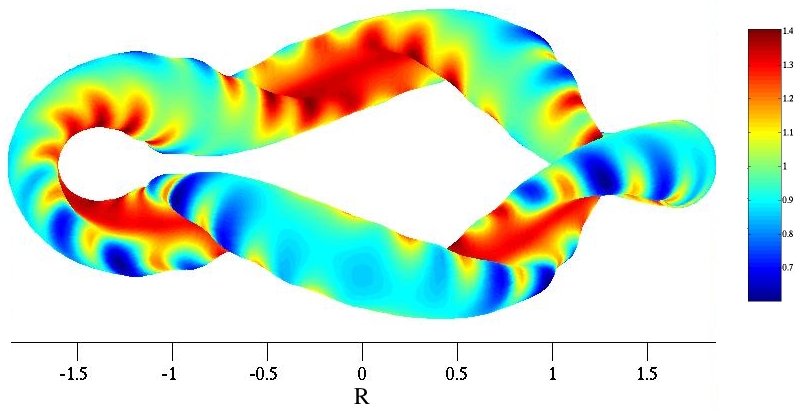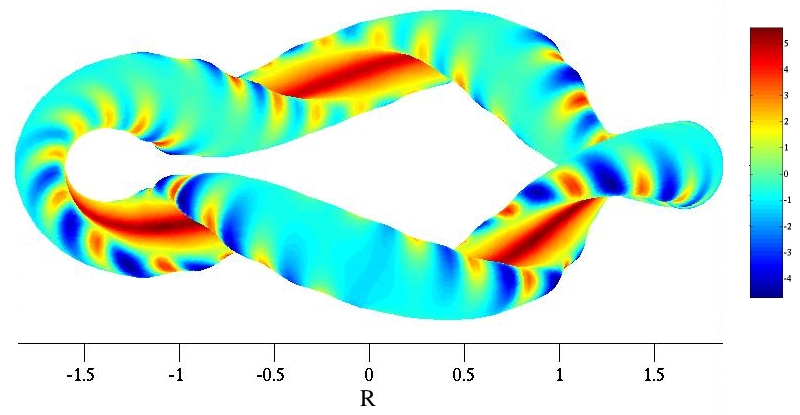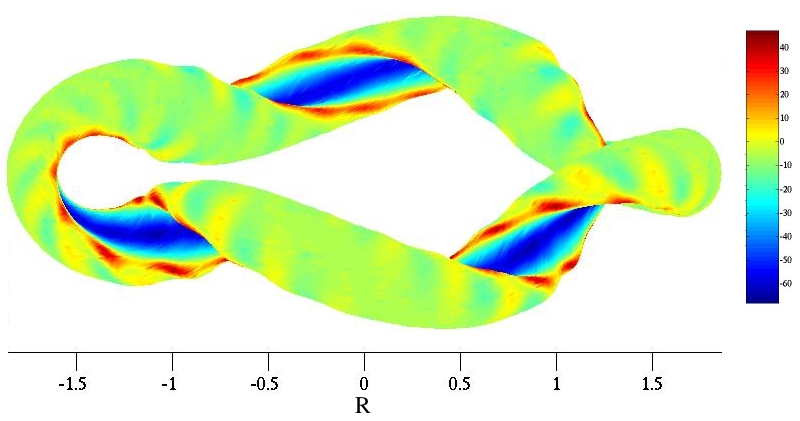TJ-II:Magnetic field: Difference between revisions
No edit summary |
No edit summary |
||
| (4 intermediate revisions by the same user not shown) | |||
| Line 1: | Line 1: | ||
The complexity of the TJ-II magnetic field is patent from the following | The complexity of the [[TJ-II]] magnetic field is patent from the following examples, in which a magnetic field property is mapped onto the last closed [[Flux surface|flux surface]] (configuration 100_44_64). The influence of the [[TJ-II:Coil system|toroidal field coils]] is clearly visible (there are 32 toroidal field coils, leading to the striped pattern), as well as that of the [[TJ-II:Coil system|circular/helical coils]] (continuous red stripe in the toroidal direction in the first two figures below). | ||
[[File:TJ-II AbsB.jpg|800px|thumb|center|TJ-II: Abs(B)]] | [[File:TJ-II AbsB.jpg|800px|thumb|center|TJ-II: Abs(B)]] | ||
| Line 5: | Line 5: | ||
[[File:TJ-II Curvature.jpg|800px|thumb|center|TJ-II: Curvature κ<sub>N</sub>]] | [[File:TJ-II Curvature.jpg|800px|thumb|center|TJ-II: Curvature κ<sub>N</sub>]] | ||
Normal [[Magnetic curvature|magnetic curvature]] of the magnetic field, κ<sub>N</sub>. | Normal [[Magnetic curvature|magnetic curvature]] of the magnetic field, κ<sub>N</sub>. | ||
Positive values of κ<sub>N</sub> are regions where curvature-driven modes are expected to be stable (note that this figure corresponds to the ''vacuum'' magnetic field -without plasma- so that strictly speaking it is not correct to speak about plasma stability). | |||
[[File:TJ-II Local shear.jpg|800px|thumb|center|TJ-II: Local shear, ''s''<sub>local</sub>]] | |||
[[Magnetic shear|Local shear]] of the magnetic field. TJ-II is a low-shear device, meaning the [[Magnetic shear|global shear]] is small; however, the value of the local shear can be quite large. | |||
== See also == | == See also == | ||
* [[TJ-II:Magnetic coordinates]] | * [[TJ-II:Magnetic coordinates]] | ||
Latest revision as of 11:24, 12 October 2009
The complexity of the TJ-II magnetic field is patent from the following examples, in which a magnetic field property is mapped onto the last closed flux surface (configuration 100_44_64). The influence of the toroidal field coils is clearly visible (there are 32 toroidal field coils, leading to the striped pattern), as well as that of the circular/helical coils (continuous red stripe in the toroidal direction in the first two figures below).

Absolute value of the magnetic field, |B| (T).

Normal magnetic curvature of the magnetic field, κN. Positive values of κN are regions where curvature-driven modes are expected to be stable (note that this figure corresponds to the vacuum magnetic field -without plasma- so that strictly speaking it is not correct to speak about plasma stability).

Local shear of the magnetic field. TJ-II is a low-shear device, meaning the global shear is small; however, the value of the local shear can be quite large.